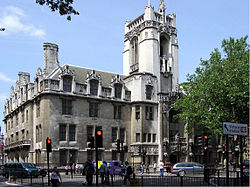Undang-undang United Kingdom
Tolong bantu menterjemahkan sebahagian rencana ini. Rencana ini memerlukan kemaskini dalam Bahasa Melayu piawai Dewan Bahasa dan Pustaka. Sila membantu, bahan-bahan boleh didapati di Law of the United Kingdom (Inggeris). Jika anda ingin menilai rencana ini, anda mungkin mahu menyemak di terjemahan Google. Walau bagaimanapun, jangan menambah terjemahan automatik kepada rencana, kerana ini biasanya mempunyai kualiti yang sangat teruk. Sumber-sumber bantuan: Pusat Rujukan Persuratan Melayu. |
United Kingdom mempunyai tiga sistem undang-undang.[1] Undang-undang Inggeris, yang digunakan di England dan Wales, dan undang-undang Ireland Utara, yang digunakan di Ireland Utara, berasaskan prinsip-prinsip common-law. Undang-undang Scotland, yang digunakan di Scotland, adalah sistem pluralistik berasaskan prinsip-prinsip undang-undang sivil, dengan unsur-unsur common law yang berasal dari tengah Zaman Pertengahan. Sementara England dan Wales, Ireland Utara, dan Scotland berlainan dalam peraturan terperinci common law dan ekuiti, dan sementara terdapat bidang tertentu kompetens perundangan diturunkan di Ireland Utara, Scotland, Wales dan London, terdapat bidang hakiki undang-undang yang digunakan di seluruh United Kingdom.

United Kingdom tidak memiliki sistem undang-undang tunggal kerana ia diwujudkan oleh penyatuan politik negara-negara merdeka, dengan Artikel 19 Perjanjian Penyatuan, yang dikuatkuasakan oleh Akta Penyatuan pada 1707, menjamin kewujudan berterusan sistem undang-undang terasing Scotland dalam Great Britain.[2] Akta Penyatuan antara Great Britain da Ireland pada 1800 pula tidak mengandungi peruntukan serupa tetapi mengekalkan prinsip mahkamah berbeza di Ireland, kini Ireland Utara sahaja.
The Supreme Court of the United Kingdom is the highest court in the land for all criminal and civil cases in England and Wales and Northern Ireland, and for all civil cases in Scots law.[3] Recent constitutional changes saw a new Supreme Court of the United Kingdom come into being in October 2009 to take on the appellate functions of the Appellate Committee of the House of Lords.[4][5] In England and Wales, the court system is headed by the Supreme Court of England and Wales, consisting of the Court of Appeal, the High Court of Justice (for civil cases) and the Crown Court (for criminal cases). The Courts of Northern Ireland follow the same pattern. In Scotland the chief courts are the Court of Session, for civil cases, and the High Court of Justiciary, for criminal cases. Sheriff courts have no equivalent outside Scotland as these Courts deal both with criminal and civil caseloads.
The Judicial Committee of the Privy Council is the highest court of appeal for several independent Commonwealth countries, the British overseas territories, and the British Crown dependencies. There are also immigration courts with UK-wide jurisdiction — the Asylum and Immigration Tribunal and Special Immigration Appeals Commission. The Employment tribunals and the Employment Appeal Tribunal have jurisdiction throughout Great Britain, but not Northern Ireland.
Nota sunting
- ^ "The UK has three legal systems, operating in England and Wales, Scotland and Northern Ireland", direct.gov.uk, dicapai 12 Mac 2007
- ^ "The Treaty (act) of the Union of Parliament 1706". Scottish History Online. Dicapai pada 5 Oktober 2008.
- ^ Constitutional reform: A Supreme Court for the United KingdomPDF (252 KiB), Department for Constitutional Affairs; accessed 22 May 2006.
- ^ UK Supreme Court judges sworn in BBC News, 1 October 2009
- ^ Constitutional reform: A Supreme Court for the United KingdomPDF (252 KB), Department for Constitutional Affairs. Retrieved on 22 May 2006